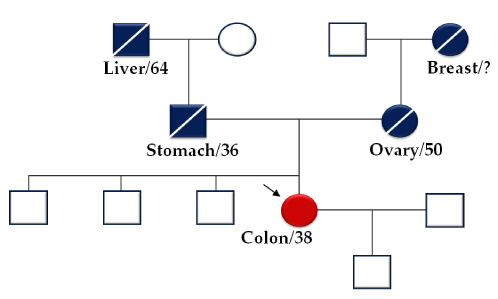Korean J Obstet Gynecol.
2012 Nov;55(11):870-873. 10.5468/KJOG.2012.55.11.870.
Endometrial cancer six years after colon cancer in Lynch syndrome: Single institution case in Korea
- Affiliations
-
- 1Division of Gynecologic Oncology, Samsung Changwon Hospital, Sungkyunkwan University School of Medicine, Changwon, Korea.
- 2Department of Obstetrics and Gynecology, Samsung Medical Center, Sungkyunkwan University School of Medicine, Seoul, Korea. minkyukim@skku.edu
- KMID: 2274159
- DOI: http://doi.org/10.5468/KJOG.2012.55.11.870
Abstract
- Here, we present a case of endometrial cancer six years after colon cancer in a Lynch syndrome patient at one institution. A 36-year-old Asian woman underwent surgery for colon cancer and six years later she underwent surgery for endometrial cancer. Based on a family history of cancer, she underwent genetic testing, including gene sequencing, after she contracted the colon cancer. A microsatellite instability test was performed and showed an unstable final result. Gene sequencing (MSH2) revealed a mutation at c.2649 T>G (p.1883M). However, her follow-up was not normal. In the second operation, immunohistochemistry showed that her endometrium stained negatively for MSH2, consistent with the previous test. As far as we know, this is a first case of metachronous cancer sin Korea regarding Lynch syndrome in single institution. It is important for enterocolonists and gynecological oncologists to screen effectively to reduce the mortality and costs associated with these genetic malignancies.
MeSH Terms
Figure
Reference
-
1. Fishel R, Lescoe MK, Rao MR, Copeland NG, Jenkins NA, Garber J, et al. The human mutator gene homolog MSH2 and its association with hereditary nonpolyposis colon cancer. Cell. 1993. 75:1027–1038.2. Leach FS, Nicolaides NC, Papadopoulos N, Liu B, Jen J, Parsons R, et al. Mutations of a mutS homolog in hereditary nonpolyposis colorectal cancer. Cell. 1993. 75:1215–1225.3. Umar A, Boland CR, Terdiman JP, Syngal S, de la Chapelle A, Ruschoff J, et al. Revised Bethesda Guidelines for hereditary nonpolyposis colorectal cancer (Lynch syndrome) and microsatellite instability. J Natl Cancer Inst. 2004. 96:261–268.4. Burke W, Petersen G, Lynch P, Botkin J, Daly M, Garber J, et al. Cancer Genetics Studies Consortium. Recommendations for follow-up care of individuals with an inherited predisposition to cancer. I. Hereditary nonpolyposis colon cancer. JAMA. 1997. 277:915–919.5. Järvinen HJ, Mecklin JP, Sistonen P. Screening reduces colorectal cancer rate in families with hereditary nonpolyposis colorectal cancer. Gastroenterology. 1995. 108:1405–1411.6. Ramsey SD, Clarke L, Etzioni R, Higashi M, Berry K, Urban N. Cost-effectiveness of microsatellite instability screening as a method for detecting hereditary nonpolyposis colorectal cancer. Ann Intern Med. 2001. 135:577–588.7. Schmeler KM, Lynch HT, Chen LM, Munsell MF, Soliman PT, Clark MB, et al. Prophylactic surgery to reduce the risk of gynecologic cancers in the Lynch syndrome. N Engl J Med. 2006. 354:261–269.8. Järvinen HJ, Aarnio M, Mustonen H, Aktan-Collan K, Aaltonen LA, Peltomäki P, et al. Controlled 15-year trial on screening for colorectal cancer in families with hereditary nonpolyposis colorectal cancer. Gastroenterology. 2000. 118:829–834.9. de Vos tot Nederveen Cappel WH, Nagengast FM, Griffioen G, Menko FH, Taal BG, Kleibeuker JH, et al. Surveillance for hereditary nonpolyposis colorectal cancer: a long-term study on 114 families. Dis Colon Rectum. 2002. 45:1588–1594.10. Burke W, Daly M, Garber J, Botkin J, Kahn MJ, Lynch P, et al. Cancer Genetics Studies Consortium. Recommendations for follow-up care of individuals with an inherited predisposition to cancer. II. BRCA1 and BRCA2. JAMA. 1997. 277:997–1003.11. Perea J, Rodríguez Y, Rueda D, Marín JC, Díaz-Tasende J, Álvaro E, et al. Early-onset colorectal cancer is an easy and effective tool to identify retrospectively Lynch syndrome. Ann Surg Oncol. 2011. 18:3285–3291.
- Full Text Links
- Actions
-
Cited
- CITED
-
- Close
- Share
- Similar articles
-
- One case of endometrial cancer occurrence: Over 10 years after colon cancer in Lynch family
- One case of Lynch type II syndrome
- Case Report of Menopausal Woman Diagnosed with Endometrial Cancer after Colon Cancer with Germline Mutation in MSH6 in Korea
- A Case of Perimenopausal Endometrial Cancer in a Woman with MSH2 Germline Mutation
- A Case of Endometrial Cancer with Hereditary Non-Polyposis Colorectal Cancer (HNPCC)




